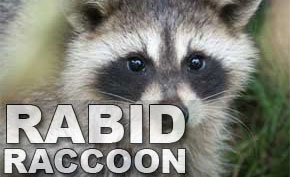Rabid Racoon Found In Escambia County
June 14, 2018
A rabid racoon has been found in Escambia County.
The Florida Department of Health in Escambia County said a raccoon recently captured in Escambia County tested positive for the virus. The exact location in which in the racoon was found has not been released.
Rabies is a viral disease that infects the central nervous system. Without proper treatment, rabies can cause brain infection and death. Rabies is transmitted by a rabid animal by a bite, a scratch, or by contact with mucous membranes such as the eyes, nose, or mouth. A series of “rabies shots” can protect a bite victim from developing the rabies infection, if given soon after the bite occurs.
“Rabies is a fatal infection but is preventable,” notes FDOH-Escambia’s director, Dr. John J. Lanza. “It is important to not feed or pet wild and stray animals, to avoid animals that appear to be acting strangely, and to keep pets vaccinated against rabies. Persons who are bitten by a wild animal or an animal who has not been vaccinated against rabies should seek immediate medical care. Proper medical treatment of an animal bite can be life-saving.”
 In Florida, raccoons, foxes, bats, and cats are the animals most frequently diagnosed with rabies. Other animals that are at high risk for rabies include dogs, bobcats, skunks, and otters. Because of their proximity to people, stray and unvaccinated cats and dogs pose a special risk.
In Florida, raccoons, foxes, bats, and cats are the animals most frequently diagnosed with rabies. Other animals that are at high risk for rabies include dogs, bobcats, skunks, and otters. Because of their proximity to people, stray and unvaccinated cats and dogs pose a special risk.
Individuals cannot always tell if an animal has rabies by looking at it. To guard against rabies, the health department recommends residents follow these steps:
- Teach your children not to go near wild and stray animals, and never keep them as pets.
- Vaccinate your dog, cat, ferret, or horse to protect against rabies. Keep vaccinations up-to-date.
- Do not feed your pets outside. The food may attract wild animals.
- Make sure your garbage is securely covered. Open garbage attracts wild and stray animals.
- Spay or neuter your pet to reduce its tendency to roam or fight.
- Do not let your pets roam freely or allow them to interact with wild or stray animals. Keep them in a fenced yard or on a leash at all times.
- Prevent bats from entering living quarters or occupied spaces in homes, churches, schools, and other similar areas, where they might come into contact with people and pets.
- Call Escambia County Animal Control, at 850-595-0097, to remove stray dogs and cats from your neighborhood.
- If your pet is bitten by another animal, immediately seek veterinary assistance for your pet and contact Escambia County Animal Control.
- If you are bitten by a wild animal, or by any animal that is acting strangely, seek medical care as soon as possible so that a physician can evaluate your risk of rabies infection and administer the rabies vaccine, if appropriate.
Comments
8 Responses to “Rabid Racoon Found In Escambia County”




Many years ago, my cat caught Rabies. We lived in Cantonment.
Mother raccoons will forage during the daytime.
Saw one out last week mid afternoon while walking my dog. Decided to turn around and go another way. Aren’t raccoons supposed to be nocturnal? I found it strange he was out middle of the day
I honestly agree with Escambia Health not advertising location. If the animal was caught in Ensley then people in Cantonment might think that they have nothing to worry about and go on with their normal business of not paying attention. If it was stated that the animal was caught on W. Roberts Rd & Hwy 29 then people in that area would be afraid to go take their garbage out or collect their mail. Rabies can be found everywhere so just be careful and use common sense.
It is simple economics. Would you rent/buy a home in a neighborhood that is known to have rabid animals nearby? This also helps avoid “mass panic” in communities where a rabid animal has been found. People will do strange and often times dangerous things in the name of protection.
@ suzy – Exactly. We don’t need a physical address, but the neighborhood or street would help. Others could watch for these types of critters in case there are more roaming. June 2017 we had a bobcat come right up to our door (captured the scene on our security camera). He’s been seen recently roaming during the day. Now we make noises and look before going outside in case there are animals near our door. (Kingsfield Rd-Ransom School Area) Many neighborhood outdoor furries are missing due to the bobcats and coyotes in our area.
Thank you Escambia County Health for withholding the location information. NOT! That’s about as dumb as you can be.
I still don’t understand why officials are always so secretive about releasing “location information” on rabid animals. We are not wanting the specific location, just a general one which would help us be more alert, informed and careful. It’s not like it is a violation of the HIPAA laws. So, was it in Warrington, Ensley, North Hill, Cantonment, Molino, Gonzalez, Beulah, East Hill, Myrtle Grove, etc.
Please find out and release location as soon as possible , I understand people should always be aware & on guard but given the fact that one has been captured with a positive infection , the location of its whereabouts is important! Thank you